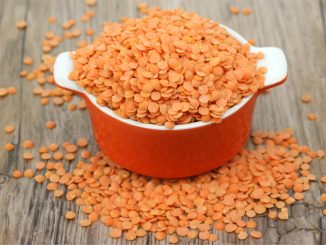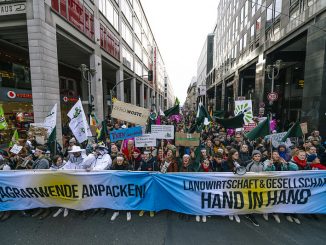
By Irina Velicu, Irina Castro, Ramona Dominicioiu, and Stefania Barca
European Coordination of Via Campesina’s call to join the#StayHomeButNotSilent call to action on April 17 to commemorate the International Day of Peasant Struggle, reiterates the fundamental role of peasants in feeding people, even in the most difficult times. It takes a crisis for alternative food systems to emerge. Is our food system, dominated by trade ideology instead of human rights, ready to face pandemics? It is now the time to wake up to the necessity of agroecology and food sovereignty, finding solutions for supporting diverse, local, autonomous small-scale and context-specific production systems.
The world is in crisis and most of us are concerned about our health. Eyes have opened more to the produced scarcity in the medical system. But there is another looming crisis that we need to be concerned about in the longer term: Is our food system dominated by trade ideology instead of human rights ready to face pandemics? While pandemics created a momentum for more debate on the models of production and consumption we may want to promote in the future, workers and farmers are literally risking their lives to continue feeding us.
The Virus before The Virus: Agribusiness
Many scientists are now saying “I told you so’ – this novel mutant virus was supposedly discovered in bats since 2013. For instance, the global health expert Alanna Shaikh recently in a TED talk warns about the epidemics yet to come because “When we burn and plow the Amazon forest .…when wild animals in China are hunted to extinction” we are inevitably contacting unexpected diseases. Similarly, Kate Jones, Chair of Ecology and Biodiversity, University College London states that Covid is to blame on ‘human actions’ that degrade the environment: “It’s not OK to transform a forest into agriculture without understanding the impact that has on climate, carbon storage, disease emergence and flood risk.” USAID funded program PREDICT, led by Prof. Dennis Carroll, dedicated more than a decade to such work of predictions, a topic in the 2020 Netflix documentary series Pandemia. I was intrigued by Carroll’s scientifically detached description of viruses, which made me think of the Big Giant corporations of capitalism: they “aren’t living organisms. … they have no machinery to be able to live on their own. They’re looking for an ecosystem that has all of the other cellular machinery essential for replication.”
But scientists do not seem to emphasize the big Virus in the room: it is not just any form of agriculture which led us here, but rather the dominant industrial model. In the case of wild animal trade in China, for instance, The Guardian reports how, as the sector became formalized and branded as luxury products, the smallholders were pushed out economically and geographically, closer to the edge of the forests, where the bats and their viruses live.
Agribusiness practically invited Pandemics: it is not agriculture per se or some abstract’ humanity that provokes viruses to mutate. It is not some neutral ‘we’ that asked for more market supplies of wild animal food. In other words, it is industrial farming and trade markets that defied predictions for few more bucks. It is not enough to focus on how to fight pandemics finding some smart technology or universal vaccine. As also Noam Chomsky has recently stated, even if pandemics was expected,
“it is a colossal market failure, …exacerbated by the savage neoliberal intensification of deep social economic problems. (…) the drug companies we have handed over our fate to are private tyrannies, unaccountable to the public, making body lotions more profitable than finding a vaccine.”
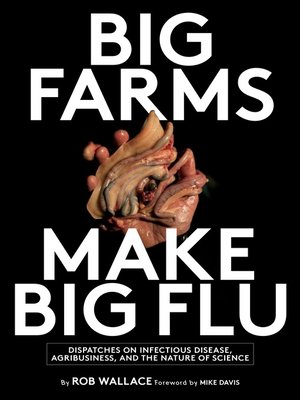
Cover of Rob Wallace’s book (Monthly Review Press, 2016)
Few scholars approach this distinction head on: one that stands out nowadays is evolutionary biologist Rob Wallace, who wrote the book Big Farms make Big Flu in 2016. As he argues, “Big Food has entered a strategic alliance with influenza’ ( p. 11). This model of industrial food production offers not only the best way to make more profits for a few big corporations but also the best way to grow and spread pathogens and diseases. He reiterates his argument in a recent interview: “if we want to understand why viruses are more dangerous nowadays, we have to take seriously the effects of industrial agriculture especially, animal production”. He adds that the death of people is merely an externality for industry “agribusiness is so focused on profits that selecting for a virus that might kill a billion people is treated as a worthy risk.”
The Coming Food Injustice of Pandemics
Pandemics are global events worsening all existing socio-environmental and food injustices because the most hit are the most vulnerable: elderly, low-income, poorly-nourished, non-white, migrants, people living in war-zones. As the most recent declaration of the High Level Expert Panel of the UN Committee on World Food Security, on the impact of COVID-19 on food security, makes clear:
“The present crisis highlights existing challenges in food systems (…) almost certainly it will manifest differently according to social class, urban and rural areas, and developing and developed countries.”
Scholars and experts in food studies are warning again about the food crisis ahead of us. In the UK for instance, Prof. Tim Lang, a leading expert on food policy, wrote that the eight companies controlling 90% of the supply will not be able provide for all the basic needs and invites governments to re-engineer capitalism:
“We have a massively fragile just-in-time supply chain which could easily collapse; a depleted agriculture sector which produces only around 50% of the food we actually eat, leaving us at the mercies of the international markets; and production methods which are damaging to the environment and human health.”
Research related to agrarian change has repeatedly shown that the prevailing system of food production – agribusiness – is essentially an insecure structural dependency on conventional industrial markets, more and more centralized, controlled and homogenous. Another crash of such markets, and the world will again be hit by food insecurity, as in 2008 (and maybe worse). Industrial food systems result in both, food insecurity and socio-ecological devastation, a vicious cycle, deteriorating ecological conditions in areas such as carbon dioxide emissions or biodiversity.
The most harmed by hunger or disease are still the communities of low-income in marginalized areas. The negative impacts associated with food production –from herbicide/pesticide contamination, and exposure to zoonotic diseases to loss of traditional lands and livelihoods or poor nutrition– also disproportionately impact marginalised populations such as residents of rural areas. ‘Food deserts’ in cities intersect with vulnerable communities and significantly increase peoples vulnerability to new diseases.
The importance of exploring a change in the paradigm of production in order to address the issues of food security and sustainability has been articulated for decades by activists, scholars and other experts, as for instance, the UN Special Rapporteur on the Right to Food, Oliver De Schutter. A key concept of such a paradigm shift is food sovereignty – as the right of communities to define own food systems. One of its recent success has been the 2018 UN Declaration on the Rights of Peasants and Other People Working in Rural Areas. In the context of this pandemics, national states have the opportunity to implement its normative principles based on the recognition that access to land, water, seeds and other natural resources is an increasing challenge for rural people, who should be supported in their efforts to promote and undertake sustainable practices of agricultural production.
Still the current concerns of states during pandemics seem to be focused on the same type of economies: while many citizens of developed nations are forced to stay home, worker migrants from less developed states are called upon to work the fields of international cheap production. Such economies continue to be based on trade and industrial farming which do not sustain ecosystems but rather multiply injustices, exploiting people while exploiting poor people who cannot isolate. The persistence of a paradigm in which food is a commodity disconnected from socio-ecological relations of solidarity and commons is going to deepen our future traumas. Living within the limits of supporting ecosystems remains an utopia.
It would be naive to think that the pandemic itself will bring much needed structural transformations in doing politics. It is important to remember that Big Capital always found opportunities in devastation: continuous theft is part of its success but also its vulnerability. The mode of unhealthy production, i.e. industrial agriculture, forced us into a global health crisis. But there are means to force the Capital Virus out of our food system.
Whoever does not have Peasants, Should find Them!
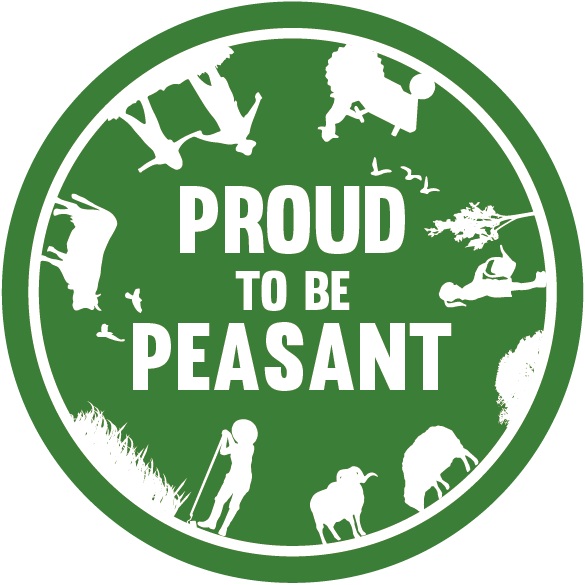
European Coordination of Via Campesina’s call to join the#StayHomeButNotSilent call to action on April 17 to commemorate the International Day of Peasant Struggle, which reiterates the fundamental role of peasants in feeding people, even in the most difficult times. Source:European Coordination Via Campesina
An old Romanian byword says that “whoever does not have grandparents must find some.” The same can be said about peasants during this pandemics: the crisis reminds us of the unrecognized work peasants and workers do in order to meet our basic needs. Clearly, peasants are risking their lives working to feed us nowadays and more generally, doing a better job at sustaining basic commons such as land, seeds or other livelihoods. But instead of hearing them, thanking them, and protecting their rights, states prefer to close the doors in their face even more: local food markets close all over Europe nowadays, defying communities’ needs. Instead of networks of care, states promote social darwinism. Leaving capitalism to, once again, gain out of their suffering would be like becoming accomplice to future crimes.
As the global peasants’ movement Via Campesina emphasized in its recent message to the world (March 2020), the model of economic production has to be radically transformed in line with food sovereignty. Farmer autonomy, local agroecological production and strong public support for agriculture is the way forward. The millions of peasants who are members of this global organization declare that they continue to put themselves in the service of humanity, to offer healthy just food. In Romania, for instance, Eco Ruralis, a national association of over twelve thousands peasants affiliated to Via Campesina, has reiterated this global message:
“The autonomy, diversity and resilience of the peasant production model are vitally important in ensuring the production of healthy food in general but especially in crisis conditions.”
During the pandemic, Eco Ruralis has organized free distribution of traditional seeds, an illustration of the value of peasant agriculture in the context of Covid.
The awareness that this is indeed the way forward for EU agriculture is becoming more widespread. The coalition platform Green New Deal for Europe, for example, demands that the Community’s agricultural policies be radically revised in order to steer economic support away from big agribusiness and towards rural communities and agroecology. The plan would fund permaculture, polycultures or regenerative agriculture, rewilding of marginal areas, agroforestry, and a transition to sustainable meat production.
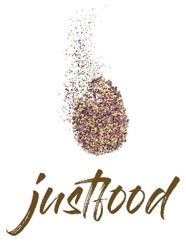
Logo of the JustFood research project.
It takes a crisis for alternative food systems to emerge: in the past, anti-austerity mobilizations for instance have gave birth to solidarity initiatives that supported the population mostly vulnerable to food shortages. It is now the time to wake up to the necessity of agroecology, finding solutions for supporting diverse, local, autonomous small-scale and context-specific production systems.
—
Irina Velicu is a political scientist working on socio-environmental conflicts in post-communist countries at the Center for Social Studies, University of Coimbra, Portugal. She is currently the Principle Investigator of the project JustFood: From Alternative Food Networks to Environmental Justice, which expands her work by looking at food justice in Europe.
Irina Castro is a junior researcher at the Centre for Social Studies, University of Coimbra, completing a PhD in the programme Governance, Knowledge and Innovation (sociology branch), in which develops a thesis about the ontological construction of transgenic seeds through the practices of scientists and their scientific controversies.
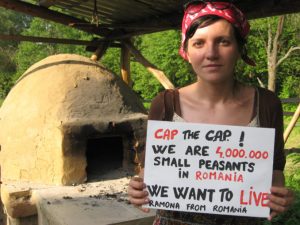 Ramona Dominicioiu (left) is a peasant woman from Romania, member of the Coordinating Committees of Eco Ruralis (Romania), the European Coordination of Via Campesina, and the global Civil Society Mechanism for the relations with the UN Committee on World Food Security (CSM-CFS).
Ramona Dominicioiu (left) is a peasant woman from Romania, member of the Coordinating Committees of Eco Ruralis (Romania), the European Coordination of Via Campesina, and the global Civil Society Mechanism for the relations with the UN Committee on World Food Security (CSM-CFS).
Stefania Barca is senior researcher at the Center for Social Studies of the University of Coimbra, where she coordinates a graduate seminar on Ecological Crisis and Democracy and lectures in Political Ecology. Her current research interests cover the environmental impact of industry in the Anthropocene, the relationship between labor and the environment, environmental justice, degrowth and commoning.
This article is republished from Undisciplined Environments with the author’s permission. Read the original article.
More by Ramona Dominicioiu on ARC2020



